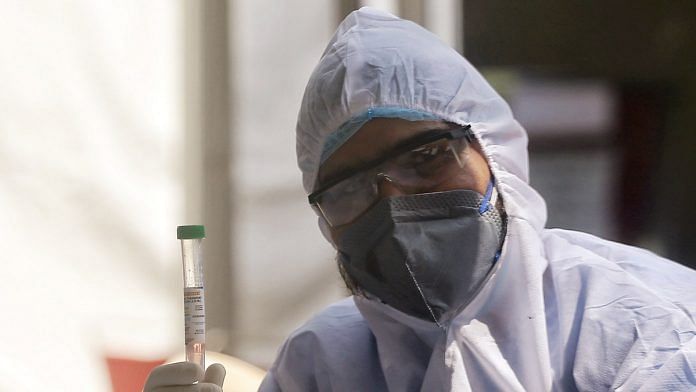New Delhi: The coronavirus pandemic has killed 414,107 people across the world so far and infected over 7.3 million. Scientists in various parts of the globe continue to learn more about the virus, hoping to aid in the development of a treatment or vaccine to prevent the spread of Covid-19.
Here are some of the latest research findings on the coronavirus.
Arthritis drug levilimab approved for severe Covid-19 patients
Russia has approved the use of levilimab — a drug originally developed for treatment of rheumatoid arthritis — to treat severe Covid-19 patients.
Clinical trials of the drug have shown that levilimab therapy can significantly reduce death risk among patients with Covid-19, according to Russian drug developer BIOCAD, which developed levilimab.
The drug is now prescribed when a patient’s immune system overreacts to the coronavirus, leading to excessive inflammation — a condition known as cytokine storm — that can be fatal.
Also read: WHO says Covid transmission through asymptomatic patients ‘very rare’, experts disagree
Survival of coronavirus on various surfaces in different cities
Researchers have evaluated how long respiratory droplets from Covid-19 infected patients can survive on various surfaces in different cities around the world.
The findings show how ambient temperature, types of surfaces and relative humidity play critical roles in the spread of Covid-19.
For example, a higher ambient temperature helped dry out droplets faster and drastically reduced chances of the virus’ survival. In places with greater humidity, droplets stayed on surfaces longer, improving chances of the virus’ survival.
The study, published in Physics of Fluids, determines droplet drying time in different outdoor weather conditions in New York, Chicago, Los Angeles, Miami, Sydney and Singapore.
They plotted the growth rate of Covid-19 patients in these cities with the drying time of a typical droplet. In the cities with a larger growth rate of the pandemic, the drying time was longer.
Most first-wave clinical trials have design flaws
A majority of the registered clinical trials for potential Covid-19 treatment that were underway till late March have design flaws, according to researchers at the Johns Hopkins Bloomberg School of Public Health.
A study, published in the BMJ Open, looks at 201 clinical trials for drugs or plasma therapy that were registered in the US and in the international clinical trials registry, which is maintained by the World Health Organization (WHO), as of 26 March.
Of these, 100 (49.8 per cent) were registered in China and 78 (37.8 per cent) in the US.
The researchers have found that many of the trials lacked key features needed to optimise their scientific value, such as use of control groups as well as patient and clinician blinding — a bias-reducing strategy in which patients as well as doctors and others who direct care and assess outcomes are kept from knowing who received the treatment or placebo.
The analysis has found that one-third of trials did not have specific endpoints to clearly define success or failure. Nearly one-half were designed to enroll fewer than 100 patients, limiting their usefulness. Two-thirds were “open label,” meaning patients and doctors were aware who did and didn’t receive the treatment — in principle, allowing their expectations to influence results.
Because of these weaknesses, many of the studies are likely to yield only preliminary evidence, researchers have said.
Loneliness in pandemic harming mental health of older adults
Social distancing, while crucial to stop the spread of Covid-19, may prove to be severely detrimental for older adults, according to a study published in the American Journal of Geriatric Psychiatry.
Researchers have found that Covid-19-based loneliness in older adults is linked to increased psychiatric symptoms of anxiety, depression and trauma.
The effect of loneliness on psychiatric symptoms was most pronounced among those who felt subjectively older than their chronological age. The findings may assist in identifying older adults at high risk for developing psychiatric symptoms due to Covid-19-related loneliness.
Scientists describe how to safely inactivate SARS-CoV-2 for research purposes
In a new study, researchers from the Georgia State University in the US have detailed methods on how to perform research on SARS-CoV-2, including procedures to effectively inactivate the virus.
The study, published in the Viruses, defines specific methods that fully make the virus non-infectious, allowing scientists to carry out further analysis of how host cells respond to an infection.
Confirming that such analyses can be done safely, with no risk of infection, will increase the rate of discovery about the virus and Covid-19, the researchers have said.
Also read: Researchers see weekly fluctuation in Covid infection & death rates, but can’t explain reason



